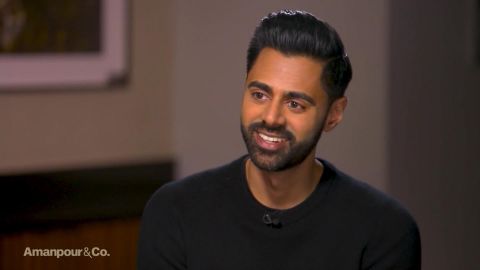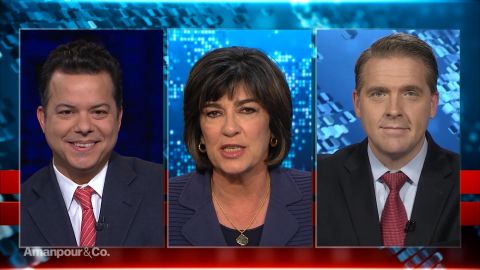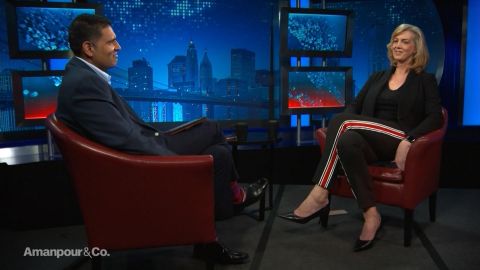Read Transcript EXPAND
HASAN MINHAJ: Currently I think not only in America but in the world, there is this claiming of what it means to be a patriotic citizen of your respective country. And I thought it would be really interesting for someone like me, a guy named Hasan Minhaj who’s an Indian-American Muslim, who’s all of those things all at once, sort of reclaiming that title. I just thought it would be really interesting.
CHRISTIANE AMANPOUR: Well, actually it is. And the fact that you talk about the hyphens and you live between the hyphens.
MINHAJ: Sure.
AMANPOUR: You just said, I’m an Indian-American Muslim.
MINHAJ: American Muslim, yes.
AMANPOUR: Which one has precedence? Which one is dominant?
MINHAJ: All of them are important to me. And that’s sort of the thing that I sort of bring to each headline piece is my perspective given those things. And so sometimes, a lot of these stories are a little bit complicated for me.
AMANPOUR: Two of the episodes have dropped already on Netflix.
MINHAJ: Correct, correct.
AMANPOUR: You’ve got an unprecedented 32-episode commitment.
MINHAJ: Right.
AMANPOUR: And you took on something that is really counterintuitive. It was the Saudi Arabian story.
MINHAJ: Yes.
AMANPOUR: And you focused on the Crown Prince MBS who’s now known all over the world. Thanks to what? The brutal murder of one of our colleagues Jamal Khashoggi.
MINHAJ: Yes.
AMANPOUR: Why did you choose that?
MINHAJ: For me, it was one of those things where again our relationship with Saudi Arabia and I mean that both as an Indian, as an American and a Muslim, has always been extremely complicated. And it’s unfortunate that the death of a journalist, this brutal murder was the thing that brought it to the light. Because just so you know, we have had this complicated — we have been taking Saudi Arabia to sword prom since FDR.
AMANPOUR: To sword prom. I love that.
MINHAJ: Yes.
AMANPOUR: And it does seem to be like everybody says to us now, “Well, we don’t know whether we should sanction them or we have to thread the needle.”
MINHAJ: Sure.
AMANPOUR: You talked about the Jamal Khashoggi murder in excruciating detail.
MINHAJ: Yes.
AMANPOUR: And you put out some sort of sound about Prince MBS’s reaction to that which I’m going to play.
(BEGIN VIDEO CLIP)
MINHAJ: Here’s the crazy part. MBS was shocked by all of the anger over the killing of one journalist. According to “Wall Street Journal” on a phone call with Jared Kushner, MBS asked, “Why the outrage?” And frankly, MBS’s confusion is completely understandable. He’s been getting away with autocratic [bleep] like this for years with almost no blowback from the international community.
(END VIDEO CLIP)
AMANPOUR: You know, it’s comedy. You do comedy.
MINHAJ: Yes.
AMANPOUR: This again is the brutal murder of one of our colleagues.
MINHAJ: Yes.
AMANPOUR: And you’re trying to thread the needle, right, between —
MINHAJ: Yes.
AMANPOUR: — what’s really out there —
MINHAJ: Yes.
AMANPOUR: — and doing it with a comic tone.
MINHAJ: Yes.
AMANPOUR: It’s tough.
MINHAJ: It can be. Yes, it can be very tough. You have to pick and choose your spots and you have to say, OK, where can I be sort of funny or interesting? Look. I think being funny is just the conduit to say what really is happening. Some of my favorite comedians of all times, the Richard Pryor’s, the David Chappelle’s, they will have these incredibly serious monologues in their specials and I really wanted to bring that to the political satire space.
About This Episode EXPAND
Christiane Amanpour interviews Scott Jennings and John Avlon about the impact of national division on the election. Hari Sreenivasan speaks with film director Kimberly Reed about the role of dark money in politcal campaigns. Christiane Amanpour sits down with writer and comedian Hasan Minhaj.
LEARN MORE


